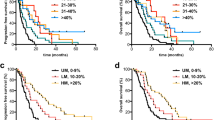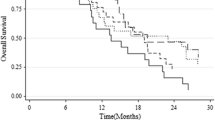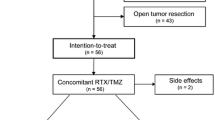Abstract
CpG methylation within the O6-methylguanine-DNA-methyltransferase (MGMT) promoter is associated with enhanced survival of glioblastoma multiforme (GBM) patients treated with temozolomide (TMZ). Although MGMT promoter is methylated in ~50% of GBM, several studies have reported a lack of correlation between MGMT methylation and protein expression levels and consequently inaccurate discrimination of TMZ sensitive and resistant patients. To understand the limitations of currently used assays, TMZ responsiveness of 13 GBM xenograft lines was correlated with MGMT protein expression and MGMT promoter methylation determined by (1) standard methylation-specific polymerase chain reaction (MS–PCR), (2) quantitative MS–PCR (qMS–PCR), and (3) bisulfite sequencing. For each xenograft line, mice with established intracranial xenografts were treated with vehicle control or TMZ (66 mg/kg × 5 days), and TMZ response was defined as relative prolongation in median survival for TMZ-treated versus control-treated mice. The relative survival benefit with TMZ was inversely related to MGMT protein expression (r = −0.75; P = 0.003) and directly correlated with qMS–PCR (r = 0.72; P = 0.006). There was a direct correlation between MGMT methylation signal by qMS–PCR and the number of methylated CpG sites within the region amplified by MS–PCR (r = 0.78, P = 0.002). However, bisulfite sequencing revealed heterogeneity in the extent of CpG methylation in those tumors with a robust qMS–PCR signal. Three of the 4 GBM lines with a qMS–PCR signal greater than 10% had at least 1 unmethylated CpG site, while only one line was fully methylated at all 12 CpG sites. These data highlight one potential limitation of the evaluation of MGMT methylation by MS–PCR assay and suggest that more detailed evaluation of methylation at individual CpG sites relative to TMZ response may be worth pursuing.




Similar content being viewed by others
References
Liu L, Gerson SL (2006) Targeted modulation of MGMT: clinical implications. Clin Cancer Res 12:328–331. doi:10.1158/1078-0432.CCR-05-2543
Paz MF, Yaya-Tur R, Rojas-Marcos I, Reynes G, Pollan M, Aguirre-Cruz L, Garcia-Lopez JL, Piquer J, Safont MJ, Balana C, Sanchez-Cespedes M, Garcia-Villanueva M, Arribas L, Esteller M (2004) CpG island hypermethylation of the DNA repair enzyme methyltransferase predicts response to temozolomide in primary gliomas. Clin Cancer Res 10:4933–4938. doi:10.1158/1078-0432.CCR-04-0392
Esteller M, Hamilton SR, Burger PC, Baylin SB, Herman JG (1999) Inactivation of the DNA repair gene o6-methylguanine-DNA methyltransferase by promoter hypermethylation is a common event in primary human neoplasia. Cancer Res 59:793–797
Hegi ME, Diserens A-C, Gorlia T, Hamou M-F, de Tribolet N, Weller M, Kros JM, Hainfellner JA, Mason W, Mariani L, Bromberg JEC, Hau P, Mirimanoff RO, Cairncross JG, Janzer RC, Stupp R (2005) MGMT gene silencing and benefit from temozolomide in glioblastoma. N Engl J Med 352:997–1003. doi:10.1056/NEJMoa043331
Sarkaria JN, Yang L, Grogan PT, Kitange GJ, Carlson BL, Schroeder MA, Galanis E, Giannini C, Wu W, Dinca EB, James CD (2007) Identification of molecular characteristics correlated with glioblastoma sensitivity to EGFR kinase inhibition through use of an intracranial xenograft test panel. Mol Cancer Ther 6:1167–1174. doi:10.1158/1535-7163.MCT-06-0691
Sarkaria JN, Carlson BL, Schroeder MA, Grogan P, Brown PD, Giannini C, Ballman KV, Kitange GJ, Guha A, Pandita A, James CD (2006) Use of an orthotopic xenograft model for assessing the effect of epidermal growth factor receptor amplification on glioblastoma radiation response. Clin Cancer Res 12:2264–2271. doi:10.1158/1078-0432.CCR-05-2510
Giannini C, Sarkaria J, Saito A, Uhm J, Galanis E, Carlson B, Schroeder M, James C (2005) Patient tumor EGFR and PDGFRA gene amplifications retained in an invasive intracranial xenograft model of GBM. Neuro-oncol 7:164–176. doi:10.1215/S1152851704000821
Esteller M, Garcia-Foncillas J, Andion E, Goodman SN, Hidalgo OF, Vanaclocha V, Baylin SB, Herman JG (2000) Inactivation of the DNA-repair gene MGMT and the clinical response of gliomas to alkylating agents. N Engl J Med 343:1350–1354. doi:10.1056/NEJM200011093431901
Matsukura S, Soejima H, Nakagawachi T, Yakushiji H, Ogawa A, Fukuhara M, Miyazaki K, Nakabeppu Y, Sekiguchi M, Mukai T (2003) CpG methylation of MGMT and hMLH1 promoter in hepatocellular carcinoma associated with hepatitis viral infection. Br J Cancer 88:521–529. doi:10.1038/sj.bjc.6600743
Kokkinakis DM, Bocangel DB, Schold SC, Moschel RC, Pegg AE (2001) Thresholds of o6-alkylguanine-DNA alkyltransferase which confer significant resistance of human glial tumor xenografts to treatment with 1,3-bis(2-chloroethyl)-1-nitrosourea or temozolomide. Clin Cancer Res 7:421–428
Leuraud P, Taillandier L, Medioni J, Aguirre-Cruz L, Criniere E, Marie Y, Kujas M, Golmard J-L, Duprez A, Delattre J-Y, Sanson M, Poupon M-F (2004) Distinct responses of xenografted gliomas to different alkylating agents are related to histology and genetic alterations. Cancer Res 64:4648–4653. doi:10.1158/0008-5472.CAN-03-3429
Middlemas DS, Stewart CF, Kirstein MN, Poquette C, Friedman HS, Houghton PJ, Brent TP (2000) Biochemical correlates of temozolomide sensitivity in pediatric solid tumor xenograft models. Clin Cancer Res 6:998–1007
Friedman HS, Dolan ME, Pegg AE, Marcelli S, Keir S, Catino JJ, Bigner DD, Schold SC Jr (1995) Activity of temozolomide in the treatment of central nervous system tumor xenografts. Cancer Res 55:2853–2857
Pandita A, Aldape KD, Zadeh G, Guha A, James CD (2003) Contrasting in vivo and in vitro fates of glioblastoma cell subpopulations with amplified EGFR. Genes Chromosomes Cancer 39:29–36. doi:10.1002/gcc.10300
Hegi ME, Diserens A-C, Godard S, Dietrich P-Y, Regli L, Ostermann S, Otten P, Van Melle G, de Tribolet N, Stupp R (2004) Clinical trial substantiates the predictive value of o-6-Methylguanine-DNA methyltransferase promoter methylation in glioblastoma patients treated with temozolomide. Clin Cancer Res 10:1871–1874. doi:10.1158/1078-0432.CCR-03-0384
Friedman HS, McLendon RE, Kerby T, Dugan M, Bigner SH, Henry AJ, Ashley DM, Krischer J, Lovell S, Rasheed K, Marchev F, Seman AJ, Cokgor I, Rich J, Stewart E, Colvin OM, Provenzale JM, Bigner DD, Haglund MM, Friedman AH, Modrich PL (1998) DNA mismatch repair and o6-alkylguanine-DNA alkyltransferase analysis and response to Temodal in newly diagnosed malignant glioma. J Clin Oncol 16:3851–3857
Rodriguez FJ, Thibodeau SN, Jenkins RB, Schowalter KV, Caron BL, O’Neill BP, James CD, Passe S, Slezak J, Giannini C (2008) MGMT immunohistochemical expression and promoter methylation in human glioblastoma. Appl Immunohistochem Mol Morphol 16:59–65
Qian X, von Wronski MA, Brent TP (1995) Localization of methylation sites in the human o6-methylguanine-DNA methyltransferase promoter: correlation with gene suppression. Carcinogenesis 16:1385–1390. doi:10.1093/carcin/16.6.1385
Watts GS, Pieper RO, Costello JF, Peng YM, Dalton WS, Futscher BW (1997) Methylation of discrete regions of the o6-methylguanine DNA methyltransferase (MGMT) CpG island is associated with heterochromatinization of the MGMT transcription start site and silencing of the gene. Mol Cell Biol 17:5612–5619
Herfarth KK, Brent TP, Danam RP, Remack JS, Kodner IJ, Wells SA Jr, Goodfellow PJ (1999) A specific CpG methylation pattern of the MGMT promoter region associated with reduced MGMT expression in primary colorectal cancers. Mol Carcinog 24:90–98. doi:10.1002/(SICI)1098-2744(199902)24:2<90::AID-MC3>3.0.CO;2-B
Yamada H, Vijayachandra K, Penner C, Glick A (2001) Increased sensitivity of transforming growth factor (TGF) beta 1 null cells to alkylating agents reveals a novel link between TGFbeta signaling and o(6)-methylguanine methyltransferase promoter hypermethylation. J Biol Chem 276:19052–19058. doi:10.1074/jbc.M100615200
Danam RP, Howell SR, Remack JS, Brent TP (2001) Heterogeneous methylation of the o(6)-methylguanine-DNA methyltransferase promoter in immortalized IMR90 cell lines. Int J Oncol 18:1187–1193
Vlassenbroeck I, Califice S, Diserens AC, Migliavacca E, Straub J, Di Stefano I, Moreau F, Hamou MF, Renard I, Delorenzi M, Flamion B, Diguiseppi J, Bierau K, Hegi ME (2008) Validation of real-time methylation-specific PCR to determine o6-methylguanine-DNA methyltransferase gene promoter methylation in glioma. J Mol Diagn 10:332–337. doi:10.2353/jmoldx.2008.070169
Danam RP, Howell SR, Brent TP, Harris LC (2005) Epigenetic regulation of o6-methylguanine-DNA methyltransferase gene expression by histone acetylation and methyl-CpG binding proteins. Mol Cancer Ther 4:61–69
Ballestar E, Esteller M, Ballestar E, Esteller M (2005) Methyl-CpG-binding proteins in cancer: blaming the DNA methylation messenger. Biochem Cell Biol 83:374–384. doi:10.1139/o05-035
Fraga MF, Ballestar E, Montoya G, Taysavang P, Wade PA, Esteller M, Fraga MF, Ballestar E, Montoya G, Taysavang P, Wade PA, Esteller M (2003) The affinity of different MBD proteins for a specific methylated locus depends on their intrinsic binding properties. Nucleic Acids Res 31:1765–1774. doi:10.1093/nar/gkg249
Sekimata M, Homma Y, Sekimata M, Homma Y (2004) Sequence-specific transcriptional repression by an MBD2-interacting zinc finger protein MIZF. Nucleic Acids Res 32:590–597. doi:10.1093/nar/gkh249
Mancini DN, Rodenhiser DI, Ainsworth PJ, O’Malley FP, Singh SM, **ng W, Archer TK (1998) CpG methylation within the 5′ regulatory region of the BRCA1 gene is tumor specific and includes a putative CREB binding site. Oncogene 16:1161–1169. doi:10.1038/sj.onc.1201630
Chien J, Staub J, Avula R, Zhang H, Liu W, Hartmann LC, Kaufmann SH, Smith DI, Shridhar V (2005) Epigenetic silencing of TCEAL7 (Bex4) in ovarian cancer. Oncogene 24:5089–5100. doi:10.1038/sj.onc.1208700
Costello JF, Futscher BW, Kroes RA, Pieper RO (1994) Methylation-related chromatin structure is associated with exclusion of transcription factors from and suppressed expression of the o-6-methylguanine DNA methyltransferase gene in human glioma cell lines. Mol Cell Biol 14:6515–6521
Acknowledgements
National Institutes of Health CA108961 (JNS/CG), CA127716 (JNS), NS49720 (CDJ), CA097257 (CDJ); American Cancer Society Research Scholar Grant (JNS); Brain Tumor Funders Consortia (JNS).
Author information
Authors and Affiliations
Corresponding author
Electronic supplementary material
Below is the link to the electronic supplementary material.
11060_2008_9737_MOESM1_ESM.pdf
[Supplementary Figure 1. TMZ survival evaluations in the xenograft panel. Mice with established orthotopic xenografts were randomized and then treated with placebo or 66 mg/kg TMZ orally for 5 days. The initiation of therapy is denoted by an arrow along the x-axis. Survival curves for each xenograft line are shown.] (PDF 96 kb)
Rights and permissions
About this article
Cite this article
Kitange, G.J., Carlson, B.L., Mladek, A.C. et al. Evaluation of MGMT promoter methylation status and correlation with temozolomide response in orthotopic glioblastoma xenograft model. J Neurooncol 92, 23–31 (2009). https://doi.org/10.1007/s11060-008-9737-8
Received:
Accepted:
Published:
Issue Date:
DOI: https://doi.org/10.1007/s11060-008-9737-8




